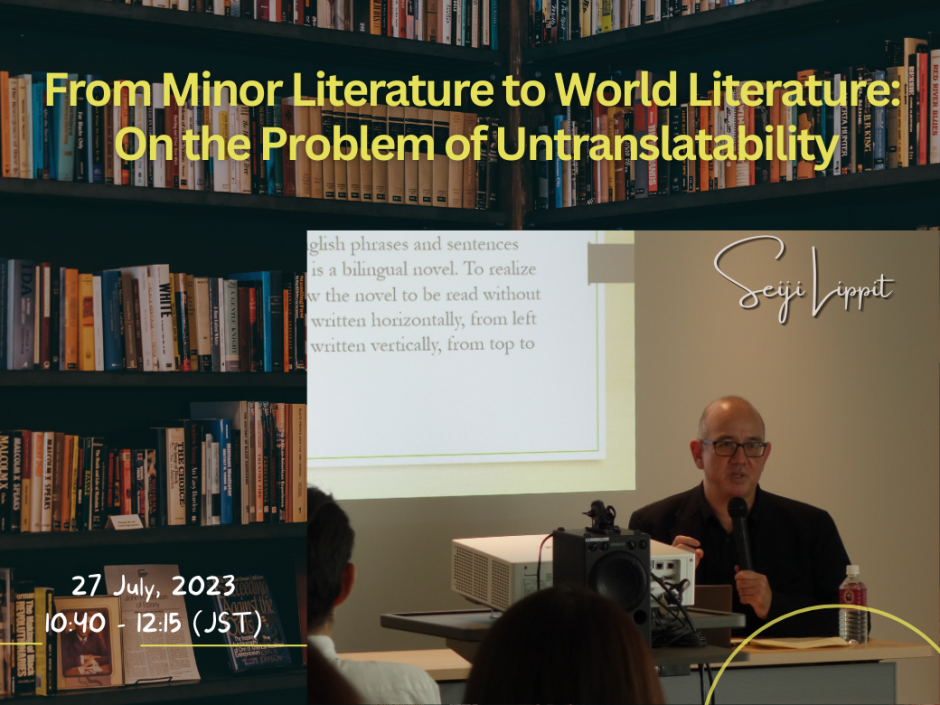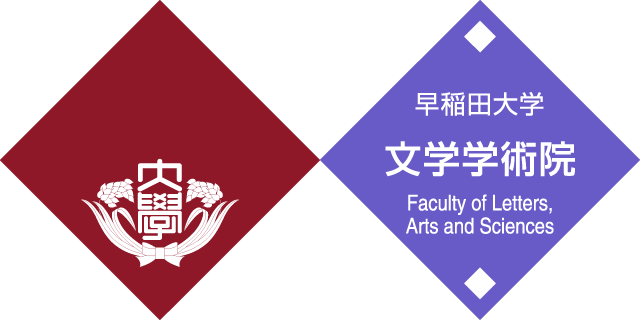- News
- Event Report: “From Minor Literature to World Literature: On the Problem of Untranslatability” by Dr. Seiji Lippit
Event Report: “From Minor Literature to World Literature: On the Problem of Untranslatability” by Dr. Seiji Lippit

- Posted
- Mon, 11 Sep 2023
The Global Japanese Studies Model Unit organized the lecture “From Minor Literature to World Literature: On the Problem of Untranslatability” by Dr. Seiji Lippit from The University of California, Los Angeles.
Student Reports:
Erika Ohki, a doctoral student (D4) of Graduate School of Letters, Arts and Sciences, Waseda University
On Thursday, July 27, 2023, the Global Japanese Studies Model Unit organized the in-person lecture, “From Minor Literature to World Literature: On the Problem of Untranslatability,” by Dr. Seiji Lippit, a visiting professor from UCLA at Waseda University. The lecture was co-organized by the Waseda International House of Literature and the Yanai Initiative for Globalizing Japanese Humanities.
In order to examine the relationship between minor literature and world literature from the perspective of translation, this lecture was divided into four sections: 1. Translation in the Age of AI, 2. Benjamin and the Double Bind of Translation, 3. Modern Literature and Translation as a Modern Institution, and 4. The (Un)Translatability of Minor Literature.
First, in “1. Translation in the Age of AI,” Japanese literary texts such as Maihime by Mori Ōgai and Yukiguni by Kawabata Yasunari were featured, and Dr. Lippit compared English translations by Edward Seidensticker with those by various translation tools (AI) that have emerged in recent years, including ChatGPT, Google Translate, and DeepL translation. He emphasized the untranslatability of the dramatic evolution of AI translation, noting that it sometimes lacks a clear understanding of context and word meanings.
In “2. Benjamin and the Double Bind of Translation,” Dr. Lippit introduced Walter Benjamin’s assertion that the more untranslatable something is, the more essential it is and the more meaningful it is to translate, as well as recent trends in translation studies such as Emily Apter’s essay, and clarified the “violence” of translation, which suppresses “voices from the margin.”
In “3. Modern Literature and Translation as a Modern Institution,” he introduced Sakai Naoki’s argument that language systems and ideas are formed through the act of translation, and, building on Sakai’s argument, focused on the fact that world literature is guaranteed its existence by the national language or national literature.
Finally, in “4. The (Un)possibility of Translation of Minor Literature,” Dr. Lippit mainly discussed the problem of translating texts using dialects or English, focusing on writers such as Ōshiro Tatsuhiro, Mizumura Minae, and Nakagami Kenji. The 1968 Nobel Prize in Literature by Kawabata Yasunari marked the entry of Japanese literature into world literature, but according to Dr. Lippit, Japanese literature has aspects of both world and minor literature. He insisted again that the consideration of the translatability or untranslatability of minor literature is also extremely important for the study of the relationship between world literature and minor literature.
In the Q&A session after the lecture, questions were asked on issues such as AI translation, the relationship between popular literature and world literature, and the minor literary aspects of Japanese literature. Dr. Lippit also mentioned the issue of the late 1960s, when Kawabata Yasunari won the Nobel Prize, as a topic for future research.
I believe that Dr. Lippit’s lecture on minor literature, world literature, and translation has provided me with significant suggestions for reexamining Japanese literary studies from a broader perspective.
Sena Kaneko, a doctoral student (D3) of Graduate School of Letters, Arts and Sciences, Waseda University
On July 27, 2023, Dr. Seiji Lippit (UCLA) gave a lecture entitled “From Minor Literature to World Literature: On the Problem of Untranslatability,” at the Waseda International House of Literature. The lecture began with an opening address by Professor Hideto Tsuboi of Waseda University.
The lecture focused primarily on the question, “What is the relationship between ‘minor literature’ and ‘world literature,’ and how is this relationship shaped?” and considered the relationship between the two in terms of translatability/untranslatability. The Nobel Prize in Literature by Yasunari Kawabata in the 1960s symbolically marked the entry of Japanese literature into world literature, but Japanese literature also exists as a minor literature with marginalized “voices.” This was the subject of Lippit’s in-depth discussion divided into four sections.
First of all, as a translation media, Lippit introduced a comparison between AI translation of modern Japanese literature (Google translation, ChatGPT, etc.) and prior translations such as Edward Seidensticker’s. Then, it became clear that untranslatability can be seen in the “border” in Yasunari Kawabata’s Yukiguni (Snow Land) and the “subject” at the beginning of Ogai Mori’s Maihime (The Dancing Girl). Referring to Walter Benjamin’s theory that “untranslatability is the essence” of the translation as a double bind, Lippit further emphasized the “violent” aspect of translation, which homogenizes minor third-world literature.
I was personally interested in the idea that national literature and national language, based on a national standardized language, are necessary as some kind of condition for a world literature to be viable. The suppression of various existing languages is also relevant to literature written in the Filipino language, which is my main concern. Therefore, it was very illuminating to point out that linguistic practices in individual literary texts challenge the above national and standardized language imperatives. Finally, Lippit explained the “challenge” of specific texts, using examples such as Misaki by Kenji Nakagami and Okinawa no Shonen by Mineo Azuma. All in all, the lecture was very interesting, offering a perspective on the possibilities of confronting the untranslatability of minor literature.
This was followed by a Q&A session, moderated by Professor Koji Toba of Waseda University. Participants asked many questions, mainly about the issues of criticism and translation in modern Japanese literature, translation in Japanese dialects and regional languages, and the relationship between popular literature and world literature, which were intended to open up the content of the lecture to related areas.
It was a stimulating time, as we were able to develop the themes presented by Lippit into a variety of issues. As for future prospects, Lippit mentioned the issue of the zeitgeist in the late 1960s (the Cold War and its relation to the U.S. military), particularly the status of Yasunari Kawabata, who won the Nobel Prize for Literature in the late 1960s, and pointed out the self-directed exoticizing and orientalizing role of Japanese literature, both major and minor.
The lecture was concluded with closing remarks by Professor Kazushige Munakata. We had a valuable opportunity to learn perspectives that are difficult to see when we study Japanese literature in Japan.
Even Overview
- Date and time: July 27, 10:40 – 12:15 (JST)
- Lecturer: Seiji Lippitt (Professor, The University of California, Los Angeles)
- Venue: The Waseda International House of Literature
- Language: English (Japanese and English for Q & A)
- Participation is free.
- Organized by: Global Japanese Studies Model Unit, Waseda University Top Global University Project, Research Institute for Letters, Arts and Sciences
- Co-organized by: The Waseda International House of Literature, The Yanai Initiative for Globalizing Japanese Humanities
- Tags
- Event Reports






